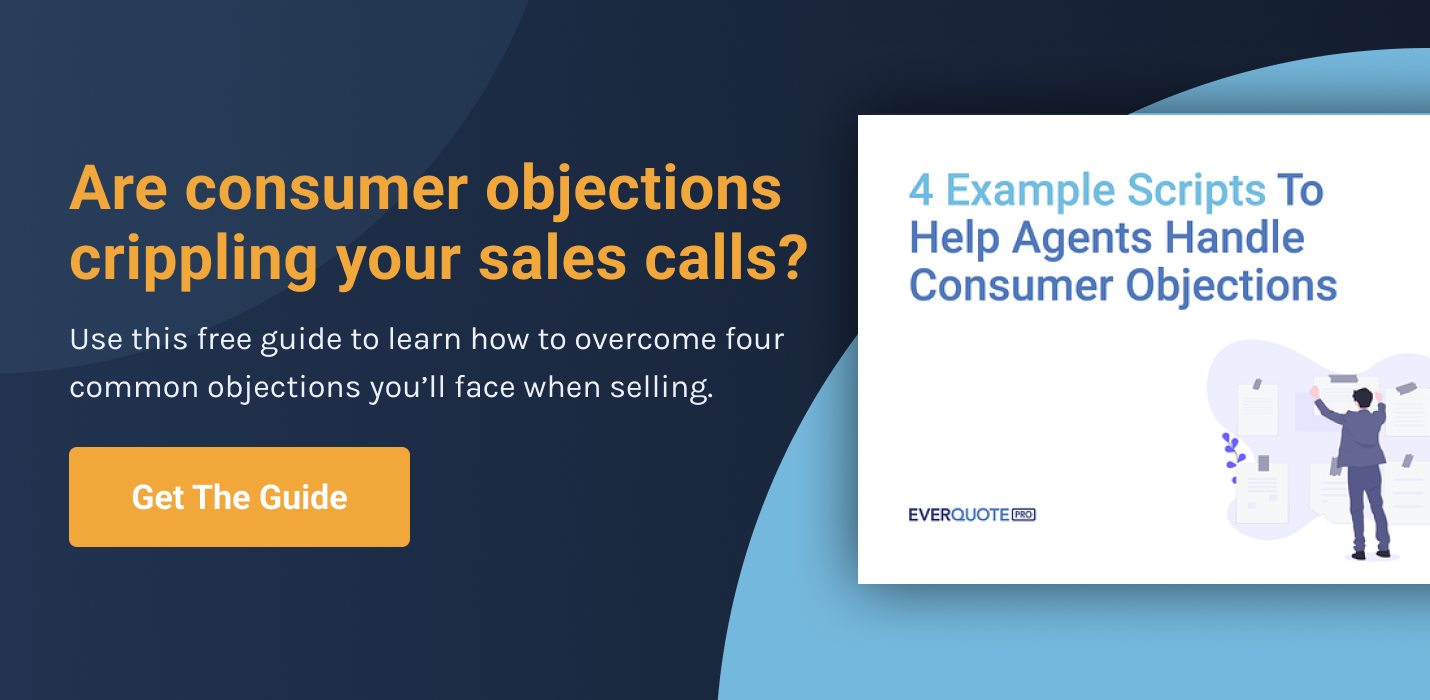- Home»
- EverQuote Pro Blog»
- Hybrid Vs. Sales-Specific Insurance Producers: Which Is Best?
Hybrid Vs. Sales-Specific Insurance Producers: Which Is Best?

In the insurance industry, there are two types of insurance producers: sales-specific and service-focused, or, more aptly, hybrid producers (because they split their focus between sales and service). In working with both types, we’ve generally seen that for agents looking to drive scalable growth, one type of insurance producer tends to generate better results. But that doesn’t mean it is the best fit for every agency out there – depending on your specific context, the benefits of using one type of producer over the other may outweigh any potential negatives. Which one might be better for your agency (and why)? Keep reading to find out.
What is a hybrid insurance producer?
A hybrid insurance producer splits their duties, spending a portion of their time focusing on sales and a portion of their time doing service-oriented work. Hybrid insurance producers wear two hats at any given time. These types of agents are fairly common in the industry, especially in smaller agencies and in longer-established agencies.
What is a sales-specific insurance producer?
Sales-specific insurance producers have one job in an agency: to sell products and grow sales numbers month-over-month. They do this by focusing exclusively on sales activities: handling leads; calling, emailing and texting prospects to get them on the phone; reviewing sales propositions; working referrals; and closing consumers as bound policies.
Unlike hybrid producers, they spend most of their time working leads to close deals—they do not handle the service aspect. It can be more expensive to have a sales-specific insurance producer, but having a sole focus on selling insurance often means more policies sold and larger growth for your agency.
Hybrid Vs. Sales-specific Insurance Producers: Which is best?
While every agency is different, in our experience, agencies that have dedicated sales-specific insurance producers generally see faster overall growth of their books compared to agencies with hybrid producers only. (Tweet this!) Your results may vary, but producer segmentation—having only one role—is our general recommendation.
For smaller agencies, having a hybrid producer is the only solution available for covering both the sales and service aspects. If this is you, that’s OK. Just keep in mind the consequences of utilizing producers in this way—when they aren’t working the phones, calling leads, and binding policies, your agency isn’t bringing in new customers.
But customer retention is crucial as well. If you have a single producer exclusively focused on bringing on new business, without at least one service-oriented team member in place, you may risk losing the customers that you worked so hard to bring on in the first place. Not to mention that it can cost up to 5X more to obtain a brand new customer than it does to keep an existing customer! So having a producer balance sales and service may ultimately be the best fit for your specific situation. Keep working to grow your agency and try to move to a point where you can hire an insurance producer solely for sales.
What if your agency has multiple producers, but none of them are sales-specific?
If you’re looking to grow your business, for most agents we’d recommend having sales-specific insurance producers on staff. It’s not ideal to take your salespeople out of the selling mindset to serve in other capacities. To identify talented salespeople within the pool of employees you already have, look for those who are motivated by making money and hitting goals, and who are aggressive about selling. These types of employees put their nose to the grindstone to get maximum ROI on a monthly basis.
Conversely, if you have an employee who is good at multitasking and you don’t have the capacity to assign them as a sales-only producer, it’s fine to have them serve as a hybrid producer. (However, we would caution against having only hybrid producers.) These types of employees are typically easier to spot—they are helpful, friendly, and eager to serve your clients every time there is a service request.
Build your team of insurance producers to complement your business growth goals.
When it’s time to decide what the hybrid/sales split should look like in your office, take a wholesale look at your staff and ask the following questions:
- Who has excelled at selling and binding policies in the last few months?
- How much time are your producers spending on sales? How much time are they spending on service?
- Are your top producers working only part-time in sales—for example, 33% sales and 66% in service? (If so, remove them from the service world and have them focus exclusively on sales.)
- How much bandwidth does your staff have? If you’re getting a lot of service requests and your staff doesn’t have time for sales, consider moving your top seller from a hybrid role and giving them a sales-specific insurance producer role. Or, bring in a new insurance producer to take on the job.
What else can you do to equip your insurance producers for success?
Finding the right people to serve as insurance producers in your agency is fundamental to your success, but it’s not all you should be doing. In addition to training and onboarding your new insurance producers, you should be filling their pipelines with leads to work.
That’s where EverQuote comes in. We provide agencies like yours with qualified leads— people who are actively looking for insurance products—in real-time. Our system works for thousands of agents (including top agents like Perry Olson), and it could be what helps your agency reach that next level of success. You can schedule a call to talk with us about our process here.
Unlock predictable growth with EverQuote.
Our representatives are standing by to help you succeed.
Call 844-707-8800
Weekdays, 9AM-5PM (ET)
Call 844-707-8800
Weekdays, 9AM-5PM (ET)
Accelerate your growth.
Complete the form below or just call 844-707-8800 to learn how we can help you achieve your goals.
By clicking "Get Started", I consent by electronic signature to being contacted by EverQuote, including by automatic telephone dialing and/or an artificial or prerecorded voice (including SMS and MMS - charges may apply), regarding EverQuote for Agents, even if my phone number is listed on a Do Not Call Registry. I also understand that my agreement to be contacted is not a condition of purchasing any goods or services, and that I may call (844) 707-8800 to speak with someone about EverQuote for Agents.
By clicking "Get Started", I affirm that I have read and agree to this website’s Privacy Policy and Terms of Use, including the arbitration provision and the E-SIGN Consent.
* Mandatory fields
 Product Overview
Product Overview Blog
Blog FAQs
FAQs Webinars
Webinars eBooks & Resources
eBooks & Resources